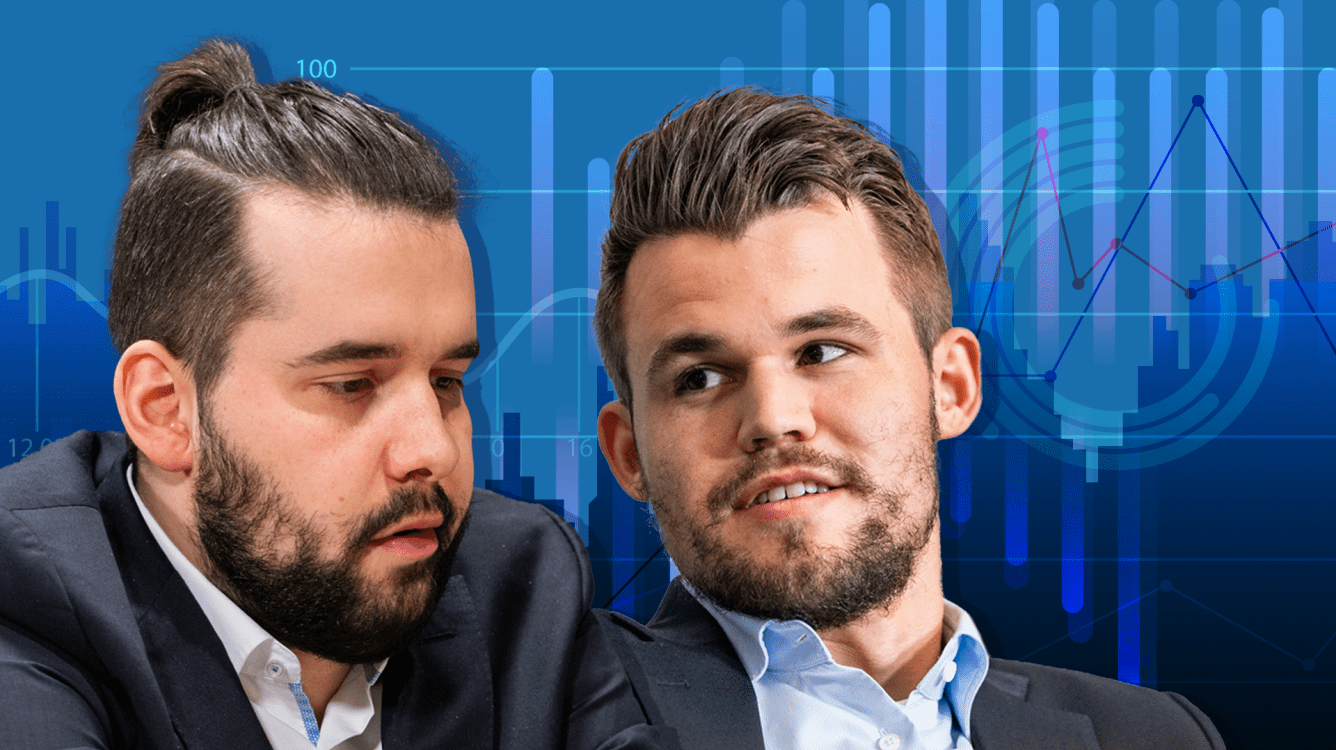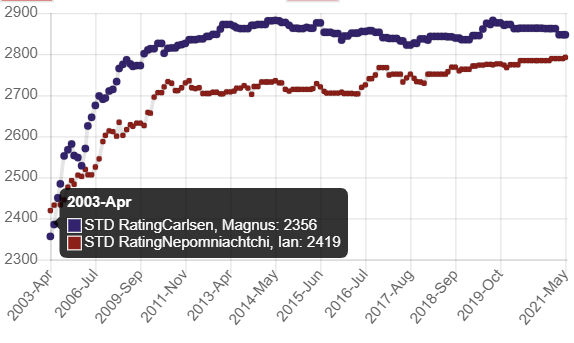
Carlsen vs. Nepomniachtchi: What Do The Numbers Say?
Fans have waited three years for the 2021 FIDE World Championship of Chess, which will feature World Champion Magnus Carlsen and GM Ian Nepomniachtchi. The unusual waiting period caused by the COVID-19 pandemic has heightened chess fans' expectations for the most important chess encounter in recent memory. If you are not familiar with the way the 2021 FIDE World Championship of Chess works, this article highlights all you need to know about the details and rules for the match.
To qualify for the challenger role, Nepomniachtchi won the 2020-21 FIDE Candidates Tournament in a field of eight world-class grandmasters. He clinched first place before the last round, when he lost to the Chinese GM Ding Liren. Despite the last round mishap, Nepomniachtchi had a 2849 performance rating in the event—two points higher than Carlsen's classical rating!
At the time of publication, 84% of Chess.com homepage survey participants think that Carlsen will win the match and 16% think we will have a new champion.

Carlsen's fans are optimistic, but I also wondered what the numbers had to say.
Prediction Methodology
To create the prediction we first have to understand the parameters of the match.
- Classical: The match will consist of 14 classical games (two more than the previous Carlsen title matches). If one player wins 7.5 points, he is determined the winner.
- Rapid: If the match is tied after 14 games, a four-game rapid tiebreak is played.
- Blitz: A rapid tiebreaker tie goes to a blitz match. If those games are tied, another two-game blitz match is played until five two-game matches are played. If there is still a tie, a sudden death game is played.
For each of the segments above, we will be running 1000 simulations to determine the odds. We need to feed the models with a predicted points-per-game and an estimated draw rate to run the simulations. Let's jump right in!
Classical Segment
The increase from a 12-game match to a 14-game match should favor the stronger player. Having more games will reduce the likelihood of an upset, and this definitely favors Carlsen. Both players will be 31 years old by the end of the match and have been rivals since they were young.

A stat that intrigues fans is that Nepomniachtchi leads Carlsen in previous classical games 4 to 1 with 6 draws [Editor's note: The players since drawn two classical games in Norway Chess, 2021.]. To help build the prediction model, I tracked stats from the last 16 world championship matches dating back to the 1985 match between GMs Garry Kasparov and Anatoly Karpov.
What I found is that previous head-to-head scores were not a strong predictor of future match scores. For example, in the 2013 World Championship, Carlsen defeated GM Viswanathan Anand twice with the black pieces even though he had never won with Black in their past 13 encounters.

The strongest predictor of performance is the current FIDE ratings of the players. Based on the rating differences in all previous matches, we would expect the champion to score 54.7% (or .547 points) per game in previous matches. However, the actual score was 51.3% for the Norwegian, a stat that should make Nepomniachtchi happy. I estimate Carlsen to score 55.0% (.55 points per game) based on their FIDE ratings.
Next, we need to determine the draw rate. I'm using a combination of the expected score and the average rating of the two players. For this match, we will estimate the draw rate to be 73%, slightly above the historical average (since 1985) of around 71%.
Rapid And Blitz Tiebreaks
The odds of the match ending in the classical segment are around 85%, so that format is getting the most attention to detail. Past rapid and blitz events have seen Carlsen scoring around 58% against Nepomniachtchi, even though the approximately 100-point gap in the segments would estimate Carlsen at 64%.

Nepomniachtchi has scored some wins against Carlsen recently in the Magnus Carlsen Invitational, Skilling Open, St. Louis Rapid & Blitz, and Legends of Chess events. Let's take a look at how the players placed in these events, and how they fared head-to-head (H2H).
| Event | Carlsen | Nepomniachtchi | H2H results |
| Legends of Chess | 1st | 2nd | 6-2 Carlsen, 6 draws |
| St. Louis Rapid & Blitz | 1st | 6th | H2H 2-0 Nepo, 1 draw |
| Skilling Open | 2nd | T-3rd | 5 draws |
| Magnus Carlsen Invitational | T-3rd | 2nd | 3-3, 5 draws |
Note that we also need to keep in mind that online chess and over-the-board chess are not the same. We are going to estimate Carlsen to score 58% in rapid and 59% in blitz. The estimated draw rates are 50% for rapid and 25% for blitz. These rates are roughly based on past rapid and blitz events.
Simulations
Running 1000 simulations on the classical match, Carlsen wins 68.9%, Nepomniachtchi 16.5%, and there is a 14.6% chance of a tiebreaker. In the previous world championship match, Carlsen and Caruana had very similar classical ratings, so it'll be interesting to see if Carlsen tries harder to win this match in the classical segment.
*Note: These simulations are based on two two-game blitz matches.
| Classical | |
| Carlsen | 68.90% |
| Nepomniachtchi | 16.50% |
| Tiebreaker | 14.60% |
I ran another 1000 simulations to estimate the odds of each player winning in the event of the match going to the rapid segment. The same exercise was completed for both of the blitz tiebreakers, and I assigned a 60% chance for Carlsen in the armageddon game.
Per segment odds
| Result | Classical | Rapid | Blitz 1 | Blitz 2 | Armageddon |
| Carlsen | 69% | 56% | 46% | 46% | 60% |
| Nepomniachtchi | 17% | 20% | 21% | 21% | 40% |
| Tiebreak | 15% | 25% | 34% | 34% | 0% |
The odds for Carlsen to win in the rapid segment, if one occurs, is 56%. Nepomniachtchi wins an estimated 20% of the time, and 25% in a blitz tiebreaker. This table shows that the longer the match goes into tiebreakers, the better the odds are for Nepomniachtchi. This is mainly due to the smaller number of games and lower draw rate.
Another way to look at the data is to determine the odds of each player winning the match at the start of each type of segment.
Odds to win at the start of segment
| Result | Classical | Rapid | Blitz1 | Blitz2 | Armageddon |
| Carlsen | 79.5% | 72% | 68% | 66% | 60% |
| Nepomniachtchi | 20.5% | 28% | 32% | 34% | 40% |
This table does a nice job showing us that a longer match favors Nepomniachtchi. His odds increase from 20.5% up to 40% as the match goes deeper into tiebreakers. That's almost a two-fold increase!
Conclusion
The online odds for this match are Carlsen -350 and Nepomniachtchi +230, which approximates to about a 72% chance of Carlsen winning the match. However, if Nepomniachtchi can perform at his 2849 Candidates event level, and match his past performances against Carlsen, I think he's very close to a 50-50 match. However, if Carlsen performs purely as the rating differences would predict, his odds would be even higher than 80%.
I'll leave you with one additional fun statistic I found while researching for this match. In the past 17 World Championship matches, only three times the challenger won the crown—and they were at least 12 years younger than the champion.
Who do you think will win the match? What do you place the odds at? Let us know in the comments below!


